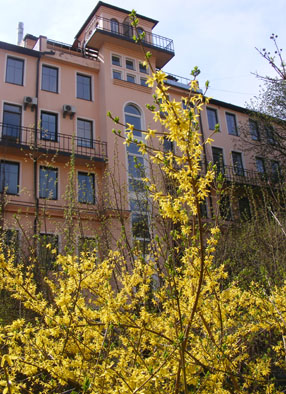Library
At the students' disposal there is a large number of books on psychology, art, computer design, advertising, and humanitarian fields of science, about four thousand in foreign languages (English, French, German, Italian, etc.) included.
The library offers:
• teaching materials prepared by teachers of the School;
• Lists of basic and further reading for all courses of lectures;
• Samples of design practice and research;
• contemporary literature in Latvian, Russian and English.
The library integrates:
• the work of students in the largest libraries of the city (the Latvian National Library, the Scientific Medical Library, Central Library and its branches, the library of the Goethe Institute). The results of retrieval practice, taking place in the libraries are issued in the form of individual reports. There are readers' conferences and reviews of new products printed materials;
• Students work with literature on the Internet;
• personal directories of students (the exchange of lists of references).
The library fund is constantly updated.
E-mail: biblio@sppa.lv
Internet room
For independent work of students the School has:
• Internet room at Bruninieku 65, on the 2nd floor – open on Tuesday, Wednesday and Friday from 10:00 to 20:00, Thursday from 10:00 to 18:00 Saturday from 11:00 to 15:00.
• For graphics work - the computer room at Bruninieku 65, 416 aud. - Weekdays from 16:00 to 18:00.
Resource Centers
Psychological Resource Center provides students the opportunity to work independently inside the school and provides an opportunity to receive advice from the teacher on duty. In the Resource Center, students have the opportunity to watch videos of psychological workshops of Latvian and foreign visiting teachers, topical videos on psychology. Teaching materials are presented in the form of graphic banner developed by the students, photos of psychologists , descriptions of psychological phenomena.
The Language Resource Center provides students the opportunity to use modern technology to develop a foreign language, as well as to work with different media channels more efficiently. . At the Faculty of translators there is Language source center where students can learn a foreign language on their own in accordance with their interests, level of knowledge. The student chooses the goal of education, decides what material is to be used in the process, as well as the time that he would devote to his\her studies. The Language Resource Center has:
.• dictionaries,
• reference books,
• Books, magazines and newspapers in various languages,
• textbooks
• teaching materials
• instructions
• recording of television programs
• videos
• audiotapes,
• Satellite TV.























